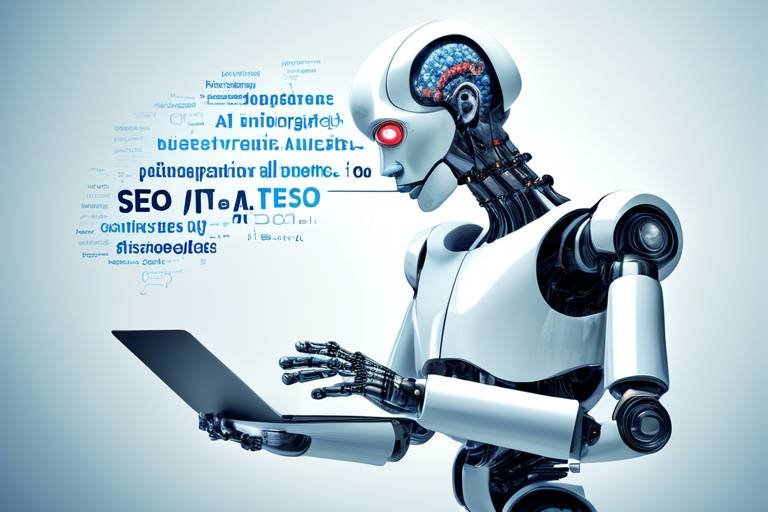Medicinal Drug Discovery & AI: A Perfect Match
In recent years, the landscape of medicinal drug discovery has undergone a seismic shift, thanks in large part to the advent of artificial intelligence (AI). This powerful technology is not just a buzzword; it is a game-changer that is revolutionizing how we develop new pharmaceuticals and improve healthcare outcomes. Imagine a world where the painstaking process of drug discovery, which can take over a decade, is accelerated significantly. With AI, this dream is becoming a reality. The combination of human ingenuity and machine learning is paving the way for breakthroughs that were once thought to be unattainable.
AI's ability to analyze vast amounts of data at lightning speed is one of its most impressive features. Traditional drug discovery methods often involve tedious trial and error, but AI can sift through mountains of biological data to identify potential drug candidates much more efficiently. This not only saves time but also reduces costs, allowing pharmaceutical companies to allocate resources more effectively. The integration of AI into drug discovery is like having a supercharged assistant that never tires and can spot patterns and connections that would take humans years to discover.
Furthermore, the intersection of AI and drug discovery is not limited to just speeding up the process. It also enhances the quality of the discoveries being made. By leveraging machine learning algorithms, researchers can uncover hidden relationships between molecular structures and their biological effects. This leads to a deeper understanding of how drugs interact with the body, which is crucial for developing safe and effective treatments. In essence, AI is acting as a compass, guiding researchers through the complex and often murky waters of pharmaceutical development.
As we delve deeper into this fascinating topic, it's essential to recognize that the synergy between AI and medicinal drug discovery is not just about technology; it’s about improving lives. Every new drug developed has the potential to change the course of a patient's life, offering hope where there was none before. The promise of AI in this field is not merely theoretical; it is being realized in laboratories around the world, where scientists are harnessing the power of AI to tackle some of the most pressing health challenges we face today.
In conclusion, the marriage of medicinal drug discovery and artificial intelligence is a perfect match that holds immense promise for the future of healthcare. As we continue to explore this exciting intersection, we can only imagine the possibilities that lie ahead. The journey has just begun, and with each new advancement, we are one step closer to a world where effective treatments are accessible to all.
- How is AI changing the drug discovery process? AI is streamlining the process by analyzing large datasets, predicting molecular interactions, and identifying potential drug candidates more quickly and efficiently.
- What are the main benefits of using AI in pharmaceuticals? The main benefits include reduced time and costs in drug development, improved accuracy in predicting drug efficacy, and enhanced ability to repurpose existing medications.
- What challenges does AI face in drug discovery? Challenges include data quality issues, regulatory hurdles, and the need for collaboration between scientists and technologists.
- What ethical considerations are involved in using AI for drug discovery? Ethical considerations include data privacy, algorithmic bias, and the transparency of AI-driven decision-making processes.

The Role of AI in Drug Discovery
Artificial Intelligence (AI) is not just a buzzword; it’s a game changer in the field of drug discovery. Imagine a world where the painstaking process of developing new medications is accelerated significantly. With AI, that dream is becoming a reality! By leveraging advanced algorithms and vast datasets, AI is streamlining processes that traditionally took years, allowing researchers to identify potential drug candidates in a fraction of the time. This transformation is crucial, especially in a landscape where time is often of the essence in saving lives.
One of the most exciting aspects of AI in drug discovery is its ability to enhance data analysis. Researchers can now analyze complex biological data sets with incredible speed and accuracy. For instance, AI can sift through millions of chemical compounds and predict how they will interact with specific biological targets. This predictive capability is akin to having a supercharged crystal ball, enabling scientists to focus their efforts on the most promising candidates. As a result, the chances of success in drug development are significantly increased.
Moreover, AI facilitates the exploration of molecular interactions, which is a critical step in understanding how drugs work. By employing techniques such as machine learning and deep learning, AI can uncover hidden patterns and relationships within data that human researchers might overlook. This is particularly important in identifying off-target effects, which can lead to adverse reactions in patients. By predicting these interactions early in the development process, AI helps to mitigate risks and enhance patient safety.
To illustrate the impact of AI in drug discovery, consider the following table that outlines key areas where AI is making strides:
| AI Application | Description |
|---|---|
| Data Mining | Extracting valuable insights from large datasets to identify potential drug candidates. |
| Molecular Modeling | Simulating molecular interactions to predict drug efficacy and safety. |
| Clinical Trial Optimization | Enhancing patient selection and trial designs based on predictive analytics. |
| Drug Repurposing | Identifying existing drugs that can be used for new therapeutic purposes. |
In summary, the role of AI in drug discovery is multifaceted and transformative. It not only accelerates the identification of new drugs but also improves the overall quality and safety of pharmaceuticals. As we continue to harness the power of AI, the future of drug development looks promising, paving the way for innovative treatments that can address some of the most pressing health challenges of our time.
Frequently Asked Questions
- How does AI improve drug discovery? AI enhances data analysis, predicts molecular interactions, and streamlines processes, leading to faster and more efficient drug development.
- What are the benefits of using AI in clinical trials? AI improves patient selection, optimizes trial designs, and extracts valuable insights from trial data, increasing the likelihood of successful outcomes.
- Can AI help in repurposing existing drugs? Yes, AI can identify existing medications that may be effective for new therapeutic uses, maximizing resource efficiency.

Machine Learning Techniques in Pharma
In the ever-evolving landscape of pharmaceuticals, machine learning (ML) has emerged as a game-changer, fundamentally altering how researchers approach drug discovery and development. By leveraging advanced algorithms and computational power, ML allows scientists to sift through vast amounts of data, uncovering patterns and insights that would be nearly impossible to detect through traditional methods. This is akin to finding a needle in a haystack, but with the right tools, that needle becomes much easier to find.
One of the most exciting applications of machine learning in pharma is its ability to analyze complex biological data. For example, researchers can utilize ML to identify potential drug candidates by examining the relationships between various biological molecules. This not only speeds up the discovery process but also enhances the accuracy of predictions regarding how these candidates will interact with target diseases. In essence, ML acts as a powerful magnifying glass, allowing researchers to zoom in on the most promising avenues for drug development.
Moreover, machine learning techniques can be categorized into several key areas that are particularly relevant to pharmaceutical research:
- Supervised Learning: This involves training algorithms on labeled datasets, allowing them to make predictions based on new, unseen data. In drug discovery, this can help in predicting the efficacy of new compounds based on historical data.
- Unsupervised Learning: Unlike supervised learning, this technique deals with unlabeled data, helping researchers identify hidden patterns or groupings in datasets. This is particularly useful in genomics, where identifying clusters of gene expressions can lead to new therapeutic targets.
- Reinforcement Learning: This technique involves algorithms that learn optimal actions through trial and error. In drug development, it can be applied to optimize clinical trial designs, improving the chances of successful outcomes.
The integration of these machine learning techniques into pharmaceutical research not only enhances the speed of drug discovery but also significantly reduces costs. Traditional drug development can take over a decade and cost billions of dollars. However, with ML, researchers can streamline various phases of the process, from initial discovery to clinical trials, making it possible to bring effective treatments to market more rapidly and efficiently.
Furthermore, as machine learning continues to advance, its applications in pharma are likely to expand. For instance, combining ML with big data analytics could lead to more personalized medicine approaches, where treatments are tailored to individual patients based on their unique genetic profiles and health histories. Imagine a world where your medication is specifically designed for your body, maximizing effectiveness while minimizing side effects. This is not just a dream; it is becoming a reality thanks to the synergy between machine learning and pharmaceutical science.
In conclusion, machine learning is not just a buzzword; it is a revolutionary force in the pharmaceutical industry. As we continue to harness its potential, we can expect to see a future where drug discovery is faster, more efficient, and ultimately more successful in improving patient outcomes. The marriage of machine learning and pharma is indeed a perfect match, and the possibilities are truly exciting.
- What is machine learning? Machine learning is a subset of artificial intelligence that uses algorithms to analyze data, learn from it, and make predictions or decisions without being explicitly programmed.
- How does machine learning improve drug discovery? By analyzing large datasets, machine learning can identify patterns and predict interactions, leading to faster identification of potential drug candidates and reducing the time and cost of development.
- What are some common machine learning techniques used in pharma? Common techniques include supervised learning, unsupervised learning, and reinforcement learning, each serving different purposes in drug discovery and development.
- Are there any challenges associated with using machine learning in pharma? Yes, challenges include data quality, the need for interdisciplinary collaboration, and ethical considerations regarding data privacy and algorithmic bias.

Predictive Modeling for Drug Efficacy
Predictive modeling is like having a crystal ball for drug development. It allows researchers to forecast how new drugs will perform in clinical settings, which is nothing short of revolutionary. Traditional methods of testing new drugs often resemble a game of chance, where researchers rely on a trial-and-error approach to see what works. This can be both time-consuming and expensive, leading to delays in bringing effective treatments to market. However, with the advent of predictive modeling, we can turn this cumbersome process into a more streamlined and efficient one.
At the heart of predictive modeling are sophisticated algorithms that analyze historical data, clinical trial results, and biological information. By identifying patterns and correlations, these models can estimate the likelihood of a drug's success before it even enters the clinical trial phase. Imagine being able to predict with a high degree of accuracy whether a new medication will be effective for a specific patient population—this is the promise of predictive modeling in drug efficacy.
One of the key advantages of predictive modeling is its ability to significantly reduce the time and costs associated with drug development. According to industry reports, the average cost of bringing a new drug to market can exceed $2.6 billion. By leveraging predictive analytics, pharmaceutical companies can make more informed decisions about which compounds to pursue, thereby conserving valuable resources. Moreover, this approach enhances the likelihood of successful outcomes for new therapies, as it allows for more targeted and personalized treatment options.
To illustrate the impact of predictive modeling, consider the following table that outlines the potential benefits:
| Benefits of Predictive Modeling | Description |
|---|---|
| Increased Efficiency | Reduces the time taken to identify viable drug candidates. |
| Cost Savings | Lowers the financial burden associated with drug development. |
| Enhanced Success Rates | Improves the chances of achieving positive clinical trial results. |
| Personalized Treatments | Facilitates the development of tailored therapies based on patient data. |
As we look to the future, the integration of predictive modeling into the drug discovery process is expected to grow. By harnessing the power of artificial intelligence and machine learning, researchers can create even more sophisticated models that account for a wider array of variables. This could lead to breakthroughs in how we understand diseases and develop treatments—making the dream of precision medicine a reality. So, the next time you hear about a new drug in the pipeline, remember that behind the scenes, predictive modeling is working tirelessly to ensure its success.

Data-Driven Insights from Clinical Trials
In the realm of drug discovery, clinical trials are pivotal, serving as the gateway to understanding how new medications perform in real-world settings. However, the sheer volume of data generated during these trials can be overwhelming. This is where artificial intelligence steps in, acting as a powerful ally in sifting through the mountains of data to extract valuable insights. By leveraging AI technologies, researchers can analyze patient data more efficiently, identifying trends and patterns that might otherwise go unnoticed.
Imagine a scenario where a clinical trial for a new cancer drug is underway. Traditionally, researchers would comb through patient responses and outcomes manually, a process that is not only time-consuming but also prone to human error. With AI, however, the process can be automated. Algorithms can analyze data in real-time, providing researchers with immediate feedback on patient responses. This allows for quicker adjustments to trial parameters and enhances the overall efficacy of the study.
Moreover, AI can help improve patient selection for clinical trials. By analyzing genetic information and other health data, AI can identify which patients are most likely to benefit from a particular treatment. This means that clinical trials can be more targeted, increasing the chances of successful outcomes and reducing the time it takes to bring a drug to market.
To illustrate the impact of AI on clinical trials, consider the following table:
| Aspect | Traditional Approach | AI-Enhanced Approach |
|---|---|---|
| Data Analysis | Manual review of data | Automated real-time analysis |
| Patient Selection | General criteria | Data-driven personalized criteria |
| Trial Adjustments | Delayed based on periodic reviews | Immediate adjustments based on ongoing data |
| Outcome Prediction | Based on historical data | Predictive modeling using current data |
This table underscores how AI can revolutionize the clinical trial process, making it more efficient and effective. Additionally, AI's ability to predict outcomes can significantly reduce the time and costs associated with traditional trial-and-error methods. By utilizing predictive modeling techniques, researchers can forecast how new drugs will perform, thereby optimizing the entire drug development process.
In summary, the integration of AI into clinical trials not only enhances data analysis but also improves patient selection and outcome predictions. As we continue to embrace these technologies, the future of drug discovery looks brighter than ever, paving the way for innovative therapies that can change lives.
- What is the role of AI in clinical trials? AI helps analyze vast amounts of data quickly and efficiently, improving patient selection and outcome predictions.
- How does AI impact patient selection? AI analyzes genetic and health data to identify patients who are most likely to benefit from specific treatments.
- Can AI reduce the time it takes to bring a drug to market? Yes, by optimizing clinical trial processes and improving data analysis, AI can significantly shorten the development timeline.
- What are the challenges of using AI in clinical trials? Challenges include data quality, regulatory hurdles, and the need for interdisciplinary collaboration among scientists and technologists.

Enhancing Drug Repurposing Efforts
In the ever-evolving landscape of pharmaceuticals, the concept of drug repurposing has emerged as a beacon of hope. This strategy involves taking existing medications that have already been approved for one condition and exploring their potential to treat other diseases. The beauty of this approach lies in its ability to dramatically reduce the time and costs associated with bringing new drugs to market. But how does AI fit into this picture?
Artificial Intelligence plays a pivotal role in enhancing drug repurposing efforts. By leveraging advanced algorithms and vast datasets, AI systems can identify new therapeutic uses for established drugs with remarkable speed and accuracy. Imagine a vast library filled with thousands of books (drugs), each containing stories (mechanisms of action) that could potentially solve different problems (diseases). AI acts as an astute librarian, swiftly sifting through the pages to find connections that might not be immediately obvious to human researchers.
One of the most significant advantages of using AI in drug repurposing is its ability to analyze complex biological data. For instance, machine learning models can examine genomic, proteomic, and metabolic data to uncover hidden patterns that suggest how a drug might work for a different condition. This data-driven approach not only speeds up the identification of promising candidates but also enhances the likelihood of success in clinical trials.
To illustrate, here’s a simplified overview of how AI enhances the drug repurposing process:
| Step | AI Contribution |
|---|---|
| Data Collection | Aggregates vast amounts of data from clinical trials, research papers, and patient records. |
| Pattern Recognition | Identifies correlations between existing drugs and new therapeutic targets. |
| Predictive Analysis | Forecasts the potential efficacy and safety of repurposed drugs. |
| Clinical Trial Design | Suggests optimal patient populations and trial parameters based on historical data. |
Moreover, the integration of AI in drug repurposing not only maximizes resource efficiency but also accelerates the delivery of treatments to patients who desperately need them. For example, during the COVID-19 pandemic, AI was instrumental in identifying existing medications that could be repurposed to combat the virus. This rapid response showcased the potential of AI to make a tangible difference in public health.
However, it's essential to recognize that while AI significantly enhances drug repurposing efforts, it doesn't eliminate the need for rigorous scientific validation. The insights generated by AI must be followed up with comprehensive laboratory experiments and clinical trials to ensure safety and efficacy. This collaborative approach between AI and traditional research methodologies creates a robust framework for discovering innovative treatments.
In summary, the synergy between AI and drug repurposing not only holds the promise of faster and more efficient drug development but also enriches our understanding of existing medications. By harnessing the power of AI, researchers can unlock new therapeutic potentials that may have otherwise remained hidden, ultimately leading to better healthcare outcomes for patients worldwide.

AI in Personalized Medicine
Artificial intelligence (AI) is making waves in the field of personalized medicine, and it’s not just a ripple; it’s a full-blown tsunami of change! Imagine a world where your treatment plan is tailored specifically to you, based on your unique genetic makeup and health history. Sounds like science fiction, right? Well, thanks to AI, this is becoming a reality. By analyzing vast amounts of patient data, including genetic information, lifestyle choices, and previous health conditions, AI can help healthcare professionals craft personalized treatment plans that are far more effective than traditional one-size-fits-all approaches.
One of the most exciting aspects of AI in personalized medicine is its ability to predict how different patients will respond to various treatments. For instance, AI algorithms can sift through historical data to identify patterns in treatment responses among similar patients. This means that doctors can make informed decisions about which medications or therapies will work best for you, significantly improving the chances of successful outcomes. It’s like having a personal health assistant who knows you inside and out!
Moreover, AI is instrumental in the development of targeted therapies. These are treatments designed to target specific genetic mutations or anomalies within a patient's disease. By utilizing AI-driven insights, researchers can identify these mutations more accurately, leading to the creation of drugs that can effectively tackle the root cause of diseases, particularly in areas like oncology. In fact, studies have shown that patients receiving targeted therapies often experience better outcomes compared to those on conventional treatments. The table below illustrates the comparison between traditional treatments and AI-driven targeted therapies:
| Treatment Type | Effectiveness | Side Effects |
|---|---|---|
| Traditional Treatments | Moderate | High |
| AI-Driven Targeted Therapies | High | Low |
But the benefits of AI in personalized medicine extend beyond just treatment selection. It also plays a crucial role in monitoring patient progress and adjusting treatment plans in real-time. For example, wearable technology can collect data on a patient’s vitals and lifestyle factors. AI can analyze this data to provide healthcare providers with insights into how a patient is responding to treatment, allowing for timely adjustments. This dynamic approach ensures that patients receive the most effective care possible, tailored to their evolving needs.
However, with great power comes great responsibility. The integration of AI into personalized medicine also raises questions about data privacy and security. How do we ensure that sensitive patient information is protected while still reaping the benefits of AI? It’s a delicate balance that requires careful consideration and robust safeguards. As we move forward, it’s essential for stakeholders in the healthcare industry to address these ethical considerations, ensuring that AI is used responsibly and transparently.
In summary, AI is not just a tool; it’s a game-changer in personalized medicine. By harnessing the power of AI, we can unlock a future where treatments are tailored to the individual, leading to better health outcomes and a more efficient healthcare system. The journey is just beginning, and the possibilities are as exciting as they are promising!
- What is personalized medicine? Personalized medicine is an innovative approach to healthcare that tailors treatment plans to individual patients based on their unique genetic, environmental, and lifestyle factors.
- How does AI contribute to personalized medicine? AI analyzes large datasets to identify patterns and predict treatment responses, helping healthcare providers create individualized treatment plans.
- Are there risks associated with AI in medicine? Yes, there are concerns regarding data privacy, algorithmic bias, and the need for transparency in AI decision-making processes.
- What are targeted therapies? Targeted therapies are treatments designed to specifically address the genetic mutations or anomalies present in a patient's disease, often leading to improved outcomes.

Challenges in Integrating AI
Integrating artificial intelligence into the realm of drug discovery is not without its hurdles. While the potential benefits are staggering, the journey towards fully harnessing AI's capabilities is fraught with challenges that can slow down progress. One of the primary issues is the quality of data. AI algorithms thrive on data, but if the data fed into these systems is incomplete, biased, or poorly structured, the outcomes can be misleading. Imagine trying to bake a cake with stale ingredients; the end product is likely to be disappointing. Similarly, flawed data can lead to ineffective drug candidates, wasting both time and resources.
Another significant challenge is navigating the complex landscape of regulatory hurdles. The pharmaceutical industry is heavily regulated, and introducing AI-driven processes requires compliance with strict guidelines. Regulatory bodies are still catching up with the rapid advancements in AI technology, which can create delays in the approval of new methodologies. This situation can be frustrating for researchers who are eager to implement innovative solutions but find themselves bogged down by red tape.
Moreover, successful AI integration demands a high level of interdisciplinary collaboration. It’s not just about having brilliant data scientists; it also requires input from biologists, chemists, and medical professionals. The challenge lies in fostering effective communication between these diverse teams. For instance, a data scientist might develop an advanced algorithm, but without the input of a biologist who understands the nuances of drug interactions, the application of that algorithm could miss the mark.
Ethical considerations also loom large in the discussion about AI in drug discovery. Questions regarding data privacy and algorithmic bias must be addressed proactively. Stakeholders need to ensure that patient data is handled responsibly and that AI systems do not inadvertently perpetuate existing biases in healthcare. This concern is critical, as biased algorithms can lead to unequal treatment options for different demographic groups, undermining the very goal of personalized medicine.
Lastly, the need for continuous education and training cannot be overstated. As AI technologies evolve, so too must the skill sets of those working in drug discovery. Organizations must invest in ongoing training programs to keep their teams up-to-date with the latest tools and techniques. This investment is not just beneficial; it’s essential for staying competitive in a fast-paced industry.
In summary, while the integration of AI into drug discovery holds immense promise, it is imperative to navigate the associated challenges thoughtfully. Addressing data quality, regulatory compliance, interdisciplinary collaboration, ethical considerations, and education will pave the way for successful AI adoption in the pharmaceutical sector.
- What are the main challenges of integrating AI in drug discovery?
The main challenges include data quality, regulatory hurdles, the need for interdisciplinary collaboration, ethical considerations, and the necessity for continuous education. - How does data quality affect AI outcomes?
Poor data quality can lead to misleading results, resulting in ineffective drug candidates and wasted resources. - Why is regulatory compliance important?
The pharmaceutical industry is heavily regulated, and compliance ensures that AI-driven processes meet safety and efficacy standards. - What role does interdisciplinary collaboration play?
Collaboration between data scientists and medical professionals is crucial for developing effective AI applications in drug discovery. - What ethical concerns are associated with AI in healthcare?
Ethical concerns include data privacy, algorithmic bias, and ensuring equitable treatment options for all demographic groups.

Ethical Considerations in AI Applications
As we dive deeper into the world of artificial intelligence and its applications in drug discovery, we can't ignore the ethical considerations that come along with it. The integration of AI into healthcare and pharmaceuticals is not just a technical challenge; it brings forth a myriad of ethical dilemmas that must be addressed to ensure that we are not only advancing science but doing so in a responsible manner.
One of the most pressing issues is data privacy. With AI systems relying heavily on large datasets, often containing sensitive patient information, the question arises: how do we protect this data? Patients have a right to know how their information is being used, and it is crucial for companies to implement robust data protection measures. This includes anonymizing data, securing consent, and being transparent about data usage. Without these safeguards, we risk breaching trust and potentially harming individuals.
Another significant concern is algorithmic bias. AI systems learn from historical data, and if that data reflects existing biases—whether based on race, gender, or socioeconomic status—the AI can inadvertently perpetuate these biases in its recommendations. For example, if a dataset lacks representation from certain demographics, the resulting AI model may not perform well for those groups. This raises a critical question: how do we ensure that AI-driven drug discovery is equitable and serves all populations fairly? Continuous monitoring and validation of AI models are essential to mitigate this risk.
Furthermore, the transparency of decision-making processes in AI applications is another ethical challenge. Many AI systems operate as "black boxes," where the reasoning behind their outputs is not easily interpretable. This lack of transparency can be particularly concerning in healthcare, where decisions can have life-altering consequences. It is vital for pharmaceutical companies to strive for explainable AI, where the rationale behind AI-generated recommendations can be understood and scrutinized by healthcare professionals and patients alike.
As we navigate these ethical waters, interdisciplinary collaboration becomes key. Scientists, ethicists, and technologists must work together to create frameworks that prioritize ethical standards in AI applications. This collaborative approach can help in developing guidelines that not only foster innovation but also protect the rights and well-being of patients.
In summary, while the potential of AI in drug discovery is immense, we must tread carefully. By addressing issues of data privacy, algorithmic bias, and transparency, we can harness the power of AI responsibly and ethically. After all, the ultimate goal is to improve healthcare outcomes for everyone, ensuring that technological advancements do not come at the cost of moral integrity.
- What are the main ethical concerns regarding AI in drug discovery?
The primary concerns include data privacy, algorithmic bias, and the transparency of decision-making processes. - How can we ensure data privacy in AI applications?
Implementing robust data protection measures, anonymizing data, and securing patient consent are essential steps. - What is algorithmic bias, and why is it important?
Algorithmic bias occurs when AI systems reflect existing biases in training data, potentially leading to unfair treatment in healthcare. - Why is transparency important in AI decision-making?
Transparency allows healthcare professionals and patients to understand and trust the recommendations made by AI systems.

Future Trends in AI-Driven Drug Discovery
The landscape of drug discovery is evolving at an unprecedented pace, largely fueled by advancements in artificial intelligence. As we look to the future, several key trends are set to shape the way pharmaceuticals are developed, making the process not only faster but also more efficient and precise. Imagine a world where AI can predict the success of a drug before it even enters the lab; this is not just a dream but a rapidly approaching reality.
One of the most exciting trends is the **increased integration of AI with biotechnology**. As these two fields converge, we can expect enhanced capabilities in gene editing and biologics development. AI algorithms will assist in designing more effective biologics, predicting how they will interact with human biology, and streamlining the development process. This could lead to breakthroughs in treatments for complex diseases, such as cancer and genetic disorders.
Moreover, the shift towards decentralized clinical trials is another trend that will revolutionize the pharmaceutical industry. AI can facilitate remote monitoring of patients, allowing for real-time data collection and analysis. This not only enhances patient engagement but also improves the quality of data collected during trials. Imagine being able to gather insights from patients in various locations without the constraints of traditional clinical settings. This will make trials more inclusive and diverse, ultimately leading to better health outcomes.
Additionally, the use of natural language processing (NLP) is set to expand significantly. NLP algorithms can analyze vast amounts of unstructured data, such as medical literature, clinical notes, and patient feedback. By extracting relevant information, AI can identify potential drug candidates and suggest new therapeutic areas for existing drugs. This ability to sift through mountains of data and distill actionable insights is akin to having a personal research assistant that never tires.
As AI continues to evolve, we can also expect a greater emphasis on **collaborative platforms** that bring together researchers, clinicians, and AI experts. These platforms will foster interdisciplinary collaboration, enabling teams to leverage their diverse expertise and improve the drug discovery process. This collaborative approach could lead to innovative solutions that none of the parties could achieve alone, much like a well-orchestrated symphony where every instrument plays a vital role.
Finally, we cannot overlook the importance of regulatory frameworks that will need to adapt to these advancements. As AI takes on a more significant role in drug discovery, regulatory bodies will need to establish guidelines that ensure the safety and efficacy of AI-driven pharmaceuticals. This will involve a delicate balance between fostering innovation and maintaining rigorous standards to protect patient health.
In conclusion, the future of AI-driven drug discovery is bright and full of promise. With the convergence of technology and medicine, we are on the brink of a new era in healthcare. The potential for faster, more effective treatments is within our reach, and it’s an exciting time to be part of this transformative journey.
- What is AI-driven drug discovery?
AI-driven drug discovery refers to the use of artificial intelligence technologies to enhance the processes involved in discovering and developing new pharmaceuticals. - How does AI improve drug efficacy?
AI improves drug efficacy by utilizing predictive modeling and data analysis to identify potential drug candidates and forecast their performance in clinical settings. - What are the challenges of integrating AI in drug discovery?
Challenges include data quality issues, regulatory hurdles, and the need for collaboration between scientists and technologists. - What future trends can we expect in AI-driven drug discovery?
Future trends include increased integration with biotechnology, decentralized clinical trials, expanded use of natural language processing, collaborative platforms, and evolving regulatory frameworks.
Frequently Asked Questions
- What is the role of AI in drug discovery?
AI plays a crucial role in drug discovery by streamlining processes, enhancing data analysis, and predicting molecular interactions. This leads to faster identification of potential drug candidates, ultimately revolutionizing how new pharmaceuticals are developed.
- How does machine learning contribute to pharmaceutical research?
Machine learning algorithms help researchers process vast datasets and uncover patterns that inform drug development strategies. By analyzing complex data, these algorithms can reveal insights that traditional methods might miss, making the research process more efficient.
- What is predictive modeling in drug discovery?
Predictive modeling techniques are used to forecast how new drugs will perform in clinical settings. This significantly reduces the time and costs associated with traditional trial-and-error approaches, making the drug development process more efficient and targeted.
- Can AI improve clinical trial outcomes?
Yes! AI can analyze clinical trial data to extract valuable insights, which improves patient selection and enhances the likelihood of successful outcomes for new therapies. This data-driven approach helps in making informed decisions throughout the trial process.
- How does AI assist in drug repurposing?
AI aids in identifying existing drugs that can be repurposed for new therapeutic uses. By analyzing existing data, AI can uncover new applications for these drugs, maximizing resource efficiency and speeding up the availability of treatments for patients.
- What is personalized medicine, and how does AI contribute to it?
Personalized medicine involves tailoring treatment plans to individual patients based on their genetic information and health data. AI contributes by analyzing this data, allowing healthcare providers to create more effective and personalized treatment strategies that improve patient outcomes.
- What challenges does AI face in drug discovery?
Despite its potential, integrating AI into drug discovery faces challenges such as data quality issues, regulatory hurdles, and the need for interdisciplinary collaboration among scientists and technologists. Addressing these challenges is crucial for successful implementation.
- Are there ethical considerations in using AI for drug discovery?
Yes, the use of AI in drug discovery raises ethical questions regarding data privacy, algorithmic bias, and the transparency of decision-making processes. It's essential to address these concerns to ensure responsible and fair application of AI technologies in healthcare.
- What does the future hold for AI-driven drug discovery?
The future of drug discovery is likely to see increased collaboration between AI and pharmaceutical companies. With advancements in technology, we can expect more innovative and effective treatments, paving the way for a healthier future.



















